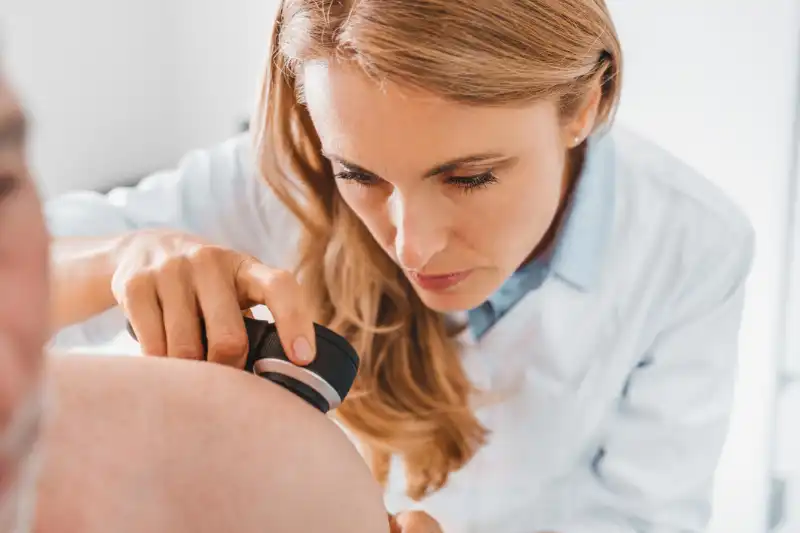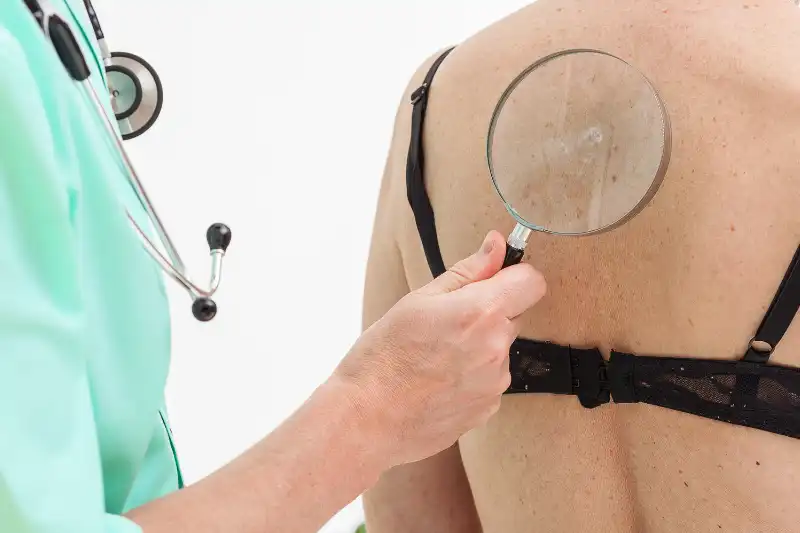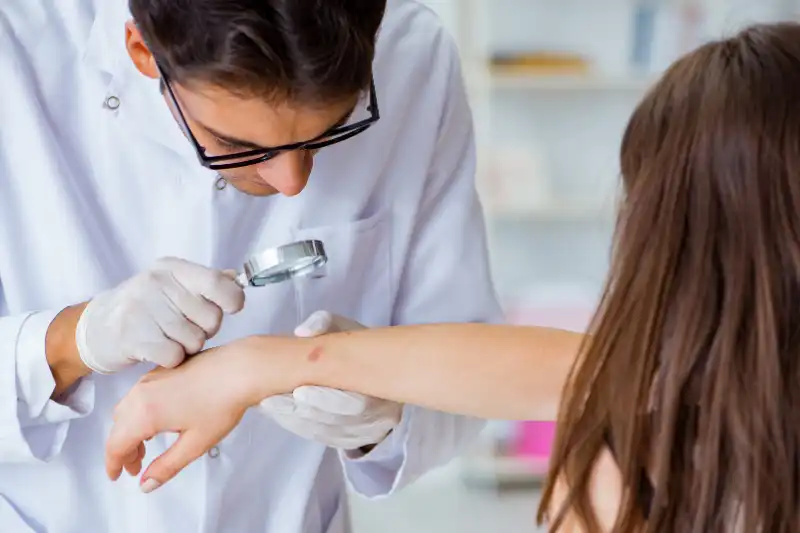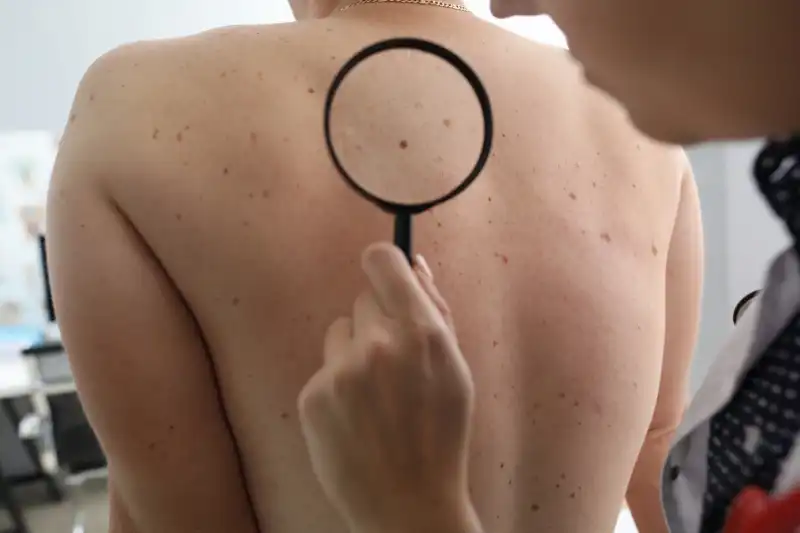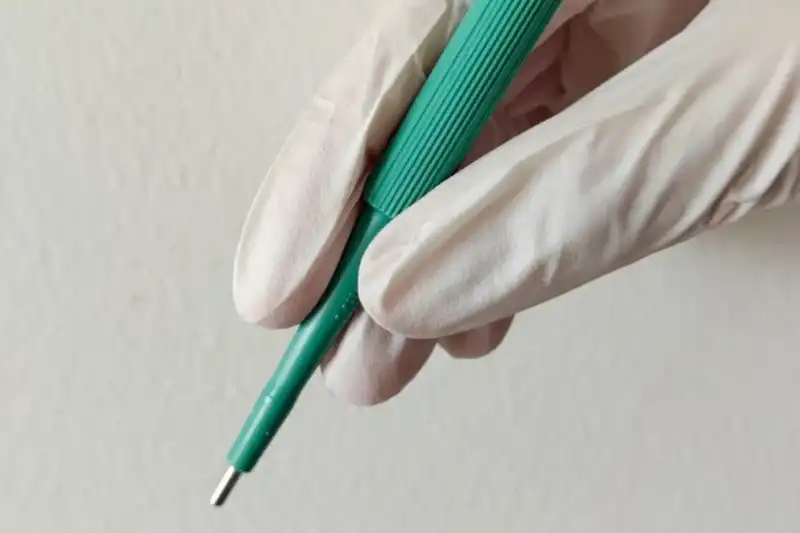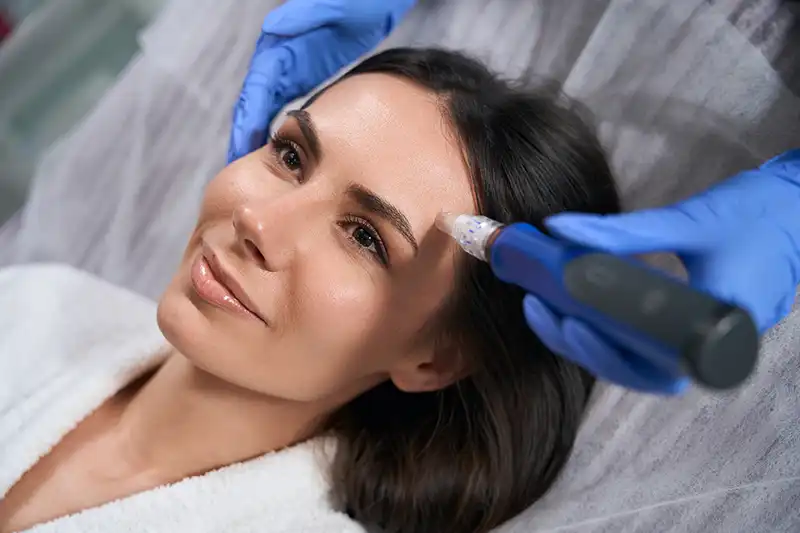How Does Skin Cancer Occur?
Skin cancer occurs when exposure to ultraviolet light disrupts the normal growth of your skin cells. You may see new skin bumps or patches and changes in the size, shape, or color of existing skin growths. Early detection is key, as most cases of skin cancer are treatable. Here’s a step-by-step overview of how skin cancer can develop:
- UV Radiation Exposure: Prolonged and repeated exposure to UV radiation can damage the DNA in skin cells. UV rays can cause mutations or changes in the DNA structure, which can lead to abnormal cell growth.
- Cell Mutation: When DNA damage occurs, it can result in mutations in skin cells. These mutations can cause the affected cells to grow and divide uncontrollably.
- Development of Skin Lesions: The uncontrolled growth of mutated cells can lead to the formation of skin lesions, such as moles, growths, or tumors. Not all skin lesions are cancerous, but some can develop into skin cancer.
- Uncontrolled Cell Growth: DNA mutations can lead to uncontrolled cell growth, where damaged skin cells divide and multiply rapidly, forming a tumor or lump on the skin.
- Tumor Formation: The rapid proliferation of damaged cells can result in the formation of a tumor or mass of abnormal skin cells. This tumor can be benign (non-cancerous) or malignant (cancerous).
- Invasion and Metastasis: In malignant skin cancer, the abnormal cells can invade nearby tissues and, in advanced stages, may spread to other parts of the body through the lymphatic system or bloodstream, a process known as metastasis.
Signs and Symptoms of Skin Cancer
Recognizing the signs and symptoms of skin cancer is crucial for early detection and timely treatment.
Common indicators of skin cancer can include:
- Changes in Moles: Keep an eye on moles that change in size, shape, color, or texture. This includes new moles or existing ones that become irregular.
- Unusual Growth or Sores: Pay attention to growths, sores, or lumps on the skin that don’t heal or continuously scab, crust, bleed, or ooze.
- Redness or Swelling: Persistent redness, swelling, or tenderness in a specific area of the skin may raise concern.
- Itching or Pain: Skin areas that become itchy, painful, or tender without an apparent cause should be examined.
- Pigment Changes: Be vigilant for pigmented areas of the skin that darken or develop unusual colors, as well as lesions with multiple shades.
- Irregular Borders: Skin spots or moles with irregular, jagged, or poorly defined borders can be a sign of skin cancer.
- Asymmetry: Examine moles or spots for asymmetry, where one half doesn’t match the other.
- Size: Any spot or mole that is larger than a pencil eraser (about 6 mm) should be checked.
- Evolving Lesions: Keep an eye on skin features that change over time, as sudden alterations can be significant.
- Family History: If you have a family history of skin cancer, you may be at a higher risk and should be particularly vigilant.
If you’re experiencing unusual skin changes such as new growths, changes in moles, sores that don’t heal, or persistent skin lesions, schedule a consultation with Dr. Joseph J. Stuckert II, MD today.

What Are the Types of Skin Cancer and How Are They Treated?
Determining the type of skin cancer you could be suffering from starts with a skin cancer screening, which can include a visual inspection, biopsy, and other diagnostic protocols. This diagnosis, which includes defining what type of skin cancer you have, combined with the location, severity, and other medical history, helps to determine the treatment path best for you.
Common Types of Skin Cancer and How They are Treated include:
Basal Cell Skin Cancers:
- Surgery: Surgical removal is the most common treatment, especially for early-stage basal cell carcinomas. Procedures like excision, mohs surgery, or curettage and electrodesiccation may be used.
- Cryotherapy: Freezing the cancerous cells with liquid nitrogen is an option for superficial basal cell carcinomas.
- Radiation Therapy: In some cases, radiation may be recommended, particularly when surgery is not suitable.
- Topical Medications: Prescription creams or gels, like imiquimod or fluorouracil, can be applied for certain superficial basal cell carcinomas.
Melanoma:
- Surgery: The primary treatment for melanoma is surgical removal. The extent of surgery depends on the melanoma’s thickness and how far it has spread.
- Lymph Node Evaluation: If melanoma has spread, nearby lymph nodes may be removed or Biopsied to check for cancer cells.
- Immunotherapy: Medications like immune checkpoint inhibitors or interleukin-2 can boost the immune system to fight melanoma.
- Targeted Therapy: Some melanomas with specific genetic mutations can be treated with targeted therapies.
- Radiation Therapy: It may be used in certain cases to relieve symptoms or treat metastatic melanoma.
Actinic Keratoses:
- Topical Treatments: Creams, gels, or solutions containing medications like imiquimod, fluorouracil, or diclofenac can be applied to the affected area.
- Cryotherapy: Freezing the lesions with liquid nitrogen is a common treatment method.
- Photodynamic Therapy: This involves applying a photosensitizing solution to the skin and then exposing it to a specific type of light to destroy the actinic keratoses.
- Chemical Peels: In some cases, chemical peels can be used to remove the top layer of skin affected by actinic keratoses.

